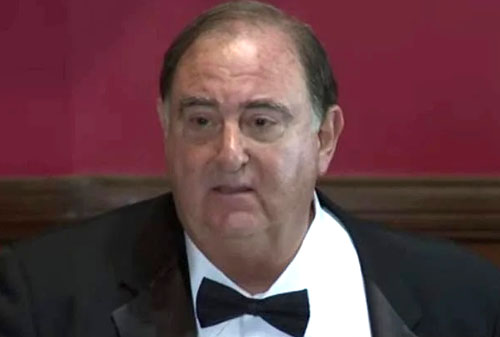by WorldTribune Staff, August 10, 2020
A former White House and State Department official said he recorded a Jan. 10, 2017 conversation with Obama era FBI informant Stefan Halper in which Halper told him “I don’t think (Michael) Flynn’s going to be around long.”
Steven Schrage made the revelation in “The Spies Who Hijacked America” and a follow-up appearance on Maria Bartiromo’s “Sunday Morning Futures” on Fox News.

Schrage noted that, in the conversation, Halper said: “The way these things work,” was that “opponents … so-called enemies” of Flynn would be “looking for ways of exerting pressure.” Flynn would be “squeezed pretty hard,” Halper suggested, and then Flynn’s “reaction to that is to blow up and get angry. He’s really f—ed. I don’t know where he goes from there. But that is his reaction. That’s why he’s so unsuitable.”
Related: FBI informant Halper played key role in FBI probe that cleared Flynn on Jan. 4, 2017, July 13, 2020
When Halper made these predictions, “Flynn’s telephone calls with the Russian ambassador were not yet publicly known,” The Federalist’s Margot Cleveland noted on Aug. 10.
On Jan. 12, 2017, The Washington Post’s David Ignatius reported on the Flynn-Kislyak calls after receiving a leak of classified information from a still unknown source, and set in motion the scenario that led to Flynn’s firing.
In the interview with Bartiromo, Schrage said Halper often bragged that Ignatius was one of his media contacts.
Schrage also said that it was he, and not Halper, who in July 2016 invited Trump campaign associate Carter Page to speak at a Cambridge conference entitled “2016’s Race to Change the World: How the U.S. Presidential Campaign Can Reshape Global Politics and Foreign Policy.” Many reports have contended that Halper sought out Page’s attendance at the conference.
It was Halper “ironically,” Schrage wrote, who “had repeatedly urged [Schrage] to cancel” the conference, which was “headlined by Presidential Candidate Hillary Clinton’s confidante Madeleine Albright.”
Instead, “after a 20-something Cambridge administrative official smugly told me ‘there’s no way Trump can win’ and cut our travel funding, it sent me on a mad scramble,” Schrage wrote. “I had to find someone, anyone, to fly over on a last-minute economy ticket to represent the Trump campaign,” and that is how Page crossed paths with Halper. During his interview with Bartiromo, Schrage added that he wanted a representative of the Trump campaign at the conference to provide balance.
Schrage said things changed when former MI6 director Richard Dearlove arrived toward the end of the conference.
“For most of the conference, Halper couldn’t be bothered with Page, about whom he made snarky comments about behind Page’s back,” Schrage wrote. “That all changed,” though, after Halper spoke to his “long-time collaborator,” Dearlove. Halper then “seemed desperately interested in isolating, cornering, and ingratiating himself to Page and promoting himself to the Trump campaign.”
On Aug. 11, 2016, the FBI asked Halper for his assistance in the Crossfire Hurricane investigation. According to DOJ Inspector General Michael Horowitz’s report, the FBI asked Halper if he knew George Papadopoulos, and after saying he didn’t, Halper “then asked whether the team had any interest in an individual named Carter Page,” the IG report said. “[T]he members of the investigative team ‘didn’t react because at that point we didn’t know where we were going to go with it,’” the IG report noted, but the Crossfire Hurricane team then asked Halper about how he knew Page.
According to the report, “Halper told the agents in mid-July 2016, Carter Page attended a three-day conference, during which Page had approached [Halper] and asked [Halper] to be a foreign policy advisor for the Trump campaign.” Given Halper’s connection to Page, the FBI tasked him to spy on Page as well as Papadopoulos, leading to Halper recording multiple conversations with the Trump associate.
Schrage said that Halper then purposefully sought out Page and then sold that connection to the FBI to spy on him. Also, under the scenario Schrage presents, Halper did so at Dearlove’s behest. But why? What was Dearlove’s interest?
In a synopsis of what he calls “the Cambridge Four,” which in addition to Dearlove and Halper includes Dearlove’s former MI6 underling, Christopher Steele, and the official MI5 historian turned Cambridge academic Christopher Andrew, Schrage said the four have fingers in several different strands of Spygate, from the spying on Page, to the invention of an affair between Flynn and the Russian-born, Cambridge Ph.D. student Svetlana Lokhova, to the Steele dossier.
Schrage, who said he alerted U.S. Attorney John Durham of his plans to go public, promised more information will be forthcoming in the days and weeks ahead. That promise indicates significant revelations could be forthcoming from Durham’s investigation into the origins of the Trump-Russia hoax.
Intelligence Brief __________ Replace The Media
